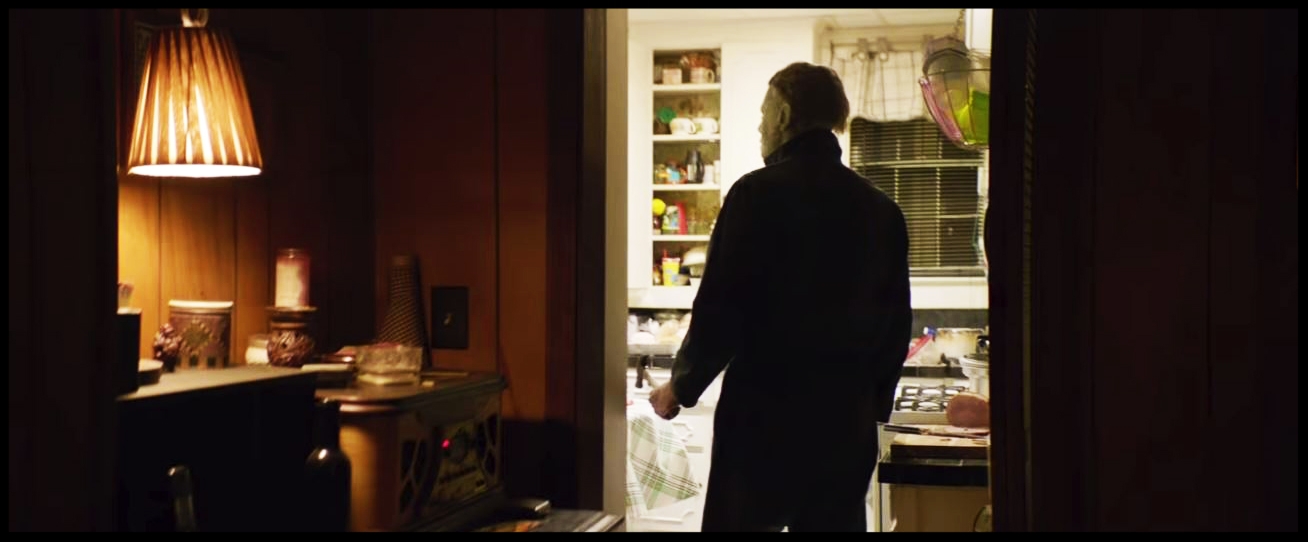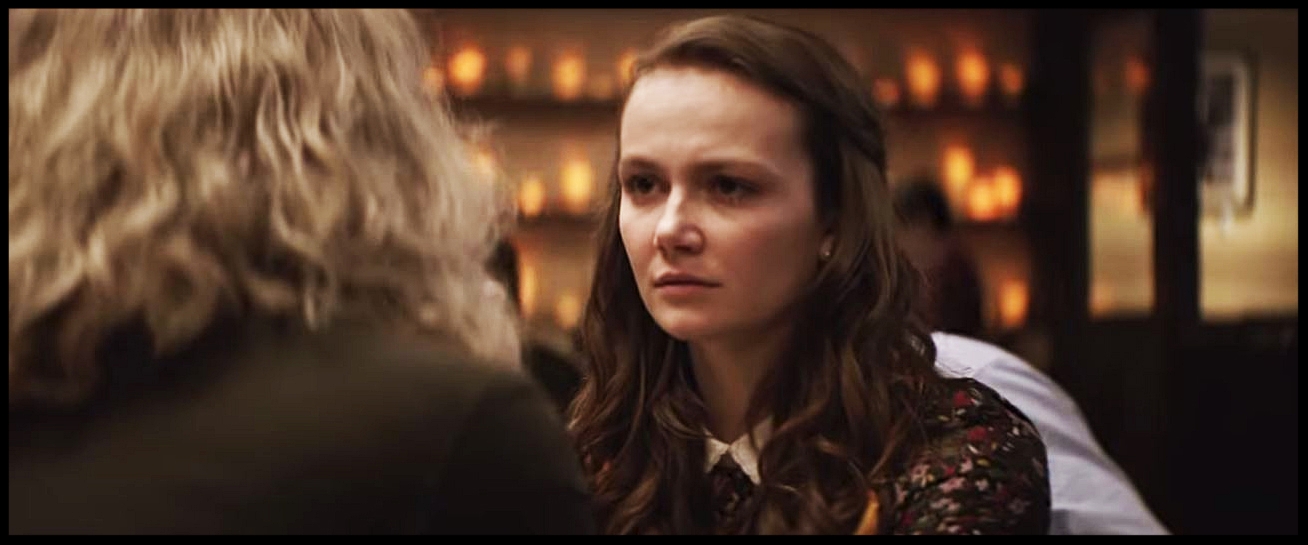Laurie Strode in Halloween (2018) as a Reflection of the Evolving Narrative of Victimhood in the Slasher Film: An Essay
Lisa Gullickson had the pleasure of viewing Halloween (2018) at Fantastic Fest in Austin and came back with definitely more than a lousy t-shirt. As always her writing is intelligent and thought provoking. Read on…
Laurie Strode sits with her back against the wall of the Wallace’s house, exhausted and sobbing while Dr. Loomis, a doctor and scientist who is supposed to have answers, stares at a blank piece of grass in disbelief. Michael Myers was still out there, and no one was safe. When were the horrors of “The Night He Came Home” over for Laurie? When her attacker disappeared into the night? When her wound healed? When he was eventually apprehended and committed for a life? Laurie Strode won, right? She brought the man down, she got the kids out of the house; he was the one who ended the movie running. When does Laurie get to feel victorious?
By design, horror movies are never over. The evil is never vanquished, just temporarily staid while the gags get more absurdist and uninspired. They go until we have Busta Rhymes in a kung fu battle with The Shape and then everyone agrees to call it quits. From San Diego Comic Con, to the Red Carpet at Fantastic Fest, to her Q&A panel following the screening of the film, the most frequently asked question asked of Jamie Lee Curtis regarding Halloween (2018) is “what brought you back to this franchise?” Curtis’s refrain remains sincerely the same. Her answer is two-fold: firstly, it’s the horror fans who have supported her since she was dubbed “ultimate scream queen,” and, secondly, the opportunity to portray Laurie Strode in a way that honors her as a victim who “takes control of her own narrative,” making herself the main character in her own story and not her attacker.
There is a trend in modern slasher films that boast a psychological bent to create curiosity and sympathy around the maniacal killer. They give them tragic childhoods, inept parents, heartless bullies, and every strata of trauma to suggest that any one of us, under twisted circumstances, can become a killer. What tends to get forgotten, or is perhaps less pleasant to think about, is that the odds are far greater that we become victims. Being a victim doesn’t take any extraordinary circumstances. It happens to people living their most mundane lives; at work, at school, when we’re walking alone or out with friends, when we’re babysitting for a family friend. What Halloween (2018) explores is what it is to be the victim after that type of profound trauma, the likes of which no one can identify with or contextualize.
On October 31st, 1978, Laurie Strode fought for her life and survived. Her attacker had sustained multiple injuries and disappeared into the night, pursued by the Illinois State Police. She only had a gash on her arm. Some might say she was lucky, and everyone said she was safe. This was the Midwest in the 70s. There was no counseling or therapy for Laurie, only bootstraps and grit to endure the psychological scars, and when this sequel opens we see all of the good it’s done her. She lives alone in a home that it is equal parts fortress and training ground. She has electric fences, an underground bunker, and a shooting range littered with bullet-ridden mannequins. She has been self-medicating with alcohol and self-righteous bitterness. She lost custody of her only child, Karen (Judy Greer), when she was 12 years old, and she would be entirely estranged from her family if it wasn’t for her granddaughter, Allyson (Andi Matichak), who has the perspective and emotional distance to try to include her in life, which, for now, is high school honor society inductions and Halloween dances with her boyfriend. Laurie Strode’s entire identity has been wrapped in a tight knot around the worst night of her life and everyone around her has given up trying to untie it.
Laurie Strode is broken, dysfunctional, misunderstood, but she is not hopeless. She has a bizarre faith in a future where she finally feels relief. She believes with all her heart in Michael Myers. She’s been assured over the decades that he has been rendered inert, sedated and in chains in the Smith Grove Rehabilitation Facility, but Laurie knows better. She witnessed The Shape be gouged, stabbed, and shot six times and not lie down. He has escaped a sanatorium before and he will escape again and this time she’ll be ready. This is not a story of revenge. In a revenge flick, Laurie Strode would have infiltrated Smith Grove herself and endangered everyone to get satisfaction. Laurie hates Michael Myers, but she does not want vengeance. She wants safety for herself and her family. The four decades of isolation and hardship were not idle. She was not wallowing. She was cultivating a specific expertise – she made herself the authority in defeating Michael Myers, and she is ready.
That is not to say she was the only one thinking about Michael Myers. Just like the Zodiac, Ted Bundy, and The Golden State Killer, true crime aficionados have not tired of speculating on tidbits that may give insight into the inner workings of his mind. There are two podcasters, Aaron Korey (Jefferson Hall) and Dana Haines (Rhian Rees), who use their NPR cred to score a face-to-face with the monster himself before he is transferred to another sanatorium. When they can’t get through to Michael, they turn to Laurie to try and get him to talk. They try to appeal to her perceived need for closure, that when she sees Myers as a non-threatening entity, drugged and confined, she can finally move on with her life. They presume that as a victim Laurie lacks the perspective that they have, as two armchair criminal psychologists. Hours of research with fervor of a dedicated hobbyist, and they still have questions about Michael Myers. Less than five minutes with Laurie Strode, and they have her all figured out.
After a traumatic event, the success of the victim is measured by how quickly and quietly they fade back into ordinary life – all Laurie had to do was shake it off, go back to school, have the requisite happy family and have her suburban house that is indistinguishable from the house next door. Successful victims don’t need help and don’t warrant any attention. Michael Myers, on the other hand, warrants a lot of attention. Michael Myers is exceptional. Since the passing of Dr. Loomis, there has been a new doctor who has made it his life’s work to study and understand Michael Myers. He has dismissed Loomis’s original hypothesis, that Michael Myers is “pure evil” that must be stopped. To Dr. Sartain (Haluk Bilginer), Michael Myers is so singular a patient and specimen that any collateral risk is well worth keeping him sentient enough for observation. Loomis lacked the unbiased perspective to see what a value Michael Myers was to the scientific community, and Sartain will be damned before anyone harms his prize.
Halloween (1978) kicked off the slasher film era, and since then we’ve seen every permutation of the unstoppable, relentless killer: from Jason, to Ghostface, to Jigsaw. Halloween itself was followed by 6 sequels, a vain attempt of an anthology film, and a reboot with it’s own sequel, all of which Halloween (2018) gives nod to, but politely excuses from canon. Halloween (2018) gives you the requisite bloody kills that place in squarely within the slasher legacy that Carpenter mastered 40 years ago, but then manages to lend to the genre something wholly unique by emphasizing the humanity of the victim, and the tragedy in the loss of human life. All too often, the victims in slashers are portrayed to have it coming somehow – they’re sexually active teens, assholes, or reckless. The victims in Halloween (2018) are portrayed as mothers, partners, and friends. They’re not cautionary tales, they’re people who had their futures stolen from them because they were in the way of a monster. Those who chose to admire and glamorize Michael Myers did not only fall prey to him, but they became accessories and extensions of his evil.
Halloween (2018) stands with Laurie Strode, showing that the trauma and stigma she suffered as a victim of Michael Myers affected every aspect of her life, but it did not rob her of her strength or dignity. The idea of victimhood and trauma has been at the center of our cultural consciousness. It started with the #blacklivesmatter movement, followed by #metoo and #timesup. Victims of violent and sexual crimes have stepped to the forefront as a means of solidarity, advocacy, and representation. The negative connotation of victims being somehow weak or otherwise taking part in their victimhood is falling away. People who live with trauma are not so irrevocably, emotionally damaged that they are rendered perspective-less and irrational. These are the individuals who have stared pure evil in the face and kept living.
No one has thought more about the character of Laurie Strode than Jamie Lee Curtis. In the Q&A session following the Fantastic Fest screening, Curtis contextualized how the last forty years has been for Laurie as such; “She left school on the 31st as a dreamer and intellectual going off to college and went back to school on November 1st a freak.” Michael Myers turned Laurie Strode into a victim, but it was a misunderstanding and an unwillingness to engage with her trauma that turned her into a pariah. He ruined a night in her life, and the rest of society took care of the rest. It will be interesting to see, as the cultural understanding of what it means to be a victim evolves, where the next chapter of the slasher film goes. Maybe all of “final girls” will be so empowered and well adjusted that those slashers won’t stand a chance.
There is nothing Laurie Strode can do to overcome being a victim. She will always be a victim, but she will no longer be victimized. Her emotional scars are as much part of her person as her physical ones, but she uses what she has learned to protect her daughter and granddaughter, and end Michael Myer’s cycle of violence for good. At least, until the next film.








